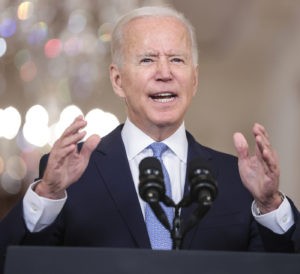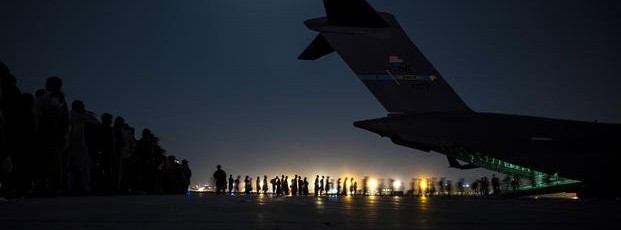Doing the right thing the wrong way seems to summarize how Americans feel about the United States’ exit from its 20-year occupation of Afghanistan.
Two national polls, conducted about a week apart, show growing confidence among Americans that leaving Afghanistan was the right thing to do. Both polls, however, show consistent dismay at how the withdrawal happened.
Meanwhile, the former president who negotiated with the Taliban to set the original deadline for America’s exit told faith leaders his successor had created a “mad rush” to get out of the country. While addressing a video call for faith leaders still rallying around Donald Trump, the former president criticized current President Joe Biden for rushing troops and refugees out of the country as the Taliban quickly regained power.
The Trump administration made a deal with the Taliban in early 2020 that called for a U.S. troop withdrawal by May 1, 2021. Biden, who took office in January 2021, chose not to renegotiate the deal but extended the withdrawal date by four months to Aug. 31.
Biden said he was boxed in by what the Trump administration had done. Former Trump administration officials said that’s not the case, that Biden could have renegotiated — although he would have negotiated with a weak hand. The reality is that both Trump and Biden wanted to end the U.S. occupation of Afghanistan that had plagued not only them but former presidents George W. Bush and Barack Obama.
And in that desire to get U.S. troops out, Trump and Biden found agreement with a majority of the American public.
In that desire to get U.S. troops out, Trump and Biden found agreement with a majority of the American public.
A Pew Research Center poll conducted amid the final drawdown in Afghanistan found 54% of U.S. adults saying it was the right decision to withdraw troops from the country, while 42% said it was wrong. That poll was conducted Aug. 23-29.
Just a few days later, Americans were asked similar questions for a Washington Post-ABC News poll that found 77% of Americans said they support withdraw of all U.S. forces from Afghanistan. That support was found across party lines, with 88% of Democrats, 74% of Republicans and 76% of independents agreeing.
What had happened between the two polls — and in the overlapping days — was more chaos as the Taliban closed in on Kabul and those who needed to escape either could not get to the airport to leave or could not get aboard the planes that were ferrying refugees in their desperate attempts to flee the coming persecution. Then on Aug. 26, a separate rebel group in Afghanistan, ISIS-K, detonated a bomb outside the airport that killed 169 Afghans and 13 U.S. service members.
While Trump and his allies have not outlined what they would have done differently to make the withdrawal less chaotic, Biden for now appears to be taking the full brunt of criticism — all while approaching the 20th anniversary of the terrorist actions that sent the U.S. to Afghanistan in response in 2001.
The Washington Post reports: “The Afghanistan withdrawal has contributed to a drop in Biden’s overall approval rating, which for the first time in his presidency is net negative. The poll finds 44% saying they approve of how he is handling his job, while 51% disapprove. In late June, the numbers were almost reversed, with 50% supporting and 42% disapproving.”
Much of that erosion in support has come from independents, the Post reported. This critical group of swing voters recorded a 14-point shift in support for Biden’s job performance from June to late August.
The Pew poll found similar results: Only 26% of Americans believing the administration has done an “excellent” or “good” job with the withdrawal, with 29% saying Biden did a “fair” job and 42% saying the administration has done a “poor” job.
For his part, Biden not only defended his administration as doing the best job possible under impossible circumstances, he used the occasion to cast a new vision of American international diplomacy.
For theologians of most faith traditions, the U.S. involvement in Afghanistan — and the appropriate response to the terrorism that prompted that engagement — has sparked endless dialogues on just war, occupation and nation-building.

President Joe Biden delivers remarks on ending the war in Afghanistan in the State Dining Room of the White House in Washington, D.C., on Aug. 31. (Photo by Oliver Contreras/Sipa USA via AP Images)
In a nationally televised speech Aug. 31, Biden used the end of the longest war in American history to call the chaotic end of the war an “extraordinary success.”
He said success of this mission was due to the incredible skill, bravery and selfless courage of the United States military and our diplomats and intelligence professionals. “For weeks, they risked their lives to get American citizens, Afghans who helped us, citizens of our allies and partners and others on board planes and out of the country.”
Those Americans and allies who helped others flee the country did so “not in a mission of war but in a mission of mercy,” he said. “No country in history has done more to airlift out the residents of another country than we have done.”
Now, it’s time for other people of goodwill to take up the baton and help care for Afghan refugees, the president said. “To everyone who is now offering, or who will offer, to welcome Afghan allies to their homes around the world, including in America, we thank you.”
In the 20 years since 9/11, the world has changed dramatically, Biden said, and so has the threat of future terrorism.
“This is a new world. The terror threat has metastasized across the world, well beyond Afghanistan. We face threats from Al Shabab in Somalia, Al Qaeda affiliates in Syria and the Arabian Peninsula, and ISIS attempting to create a caliphate in Syria and Iraq and establishing affiliates across Africa and Asia,” he explained.
“The fundamental obligation of a president, in my opinion, is to defend and protect America. Not against threats of 2001, but against the threats of 2021 and tomorrow. That is the guiding principle behind my decisions about Afghanistan.”
A few minutes later, he returned to the theme of a new world order: “The world is changing. We’re engaged in a serious competition with China. We’re dealing with the challenges on multiple fronts with Russia. We’re confronted with cyberattacks and nuclear proliferation. We have to shore up American competitiveness to meet these new challenges and the competition for the 21st century. And we can do both: fight terrorism and take on new threats that are here now and will continue to be here in the future. And there’s nothing China or Russia would rather have, would want more in this competition, than the United States to be bogged down for another decade in Afghanistan.”
And then he spoke of hopes for peace.
“We’ve been a nation too long at war.”
“We’ve been a nation too long at war. If you’re 20 years old today, you’ve never known an America at peace. So when I hear that we could have, should have, continued this so-called low-grade effort in Afghanistan, at low risk to our service members, at low cost, I don’t think enough people understand how much we have asked of the 1% of this country who put that uniform on, willing to put their lives on the line in defense of our nation.”
He concluded: “There’s nothing low grade or low risk or low cost about any war. It’s time to end the war in Afghanistan. As we close 20 years of war and strife and pain and sacrifice, it’s time to look to the future, not the past. To a future that’s safer, to a future that’s more secure. To a future that honors those who’ve served and all those who gave what President Lincoln called their ‘last full measure of devotion.’ I give you my word with all of my heart. I believe this is the right decision, a wise decision and the best decision for America.”
Related articles:
Afghanistan: A tragic example of an unjust war | Analysis by Chris Conley
Blame me for the situation in Afghanistan | Opinion by Craig Nash
Reflecting on the effects of 9/11 and the disarray of America foreign policy | Opinion by David Gushee
Afghanistan and America: Bloodlust and the failure of prophetic imagination | Opinion by Wendell Griffen
Love ’em and leave ’em: America walks out on Afghanistan | Opinion by Erich Bridges

